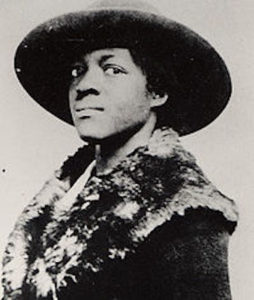
Mabel Hampton
*Mabel Hampton was born on this date in 1902. She was a Black lesbian activist, a dancer, and a philanthropist.
Born in Winston-Salem, North Carolina, Hampton was only two months old when her mother died. She was then raised by her grandmother, who died when Hampton was seven. In 1909, the seven-year-old Hampton was put on a train to New York City, where she went to live with her aunt and uncle. Within a year, Hampton ran away from that home, having been raped by her uncle and treated poorly by the family.
From ages eight to 17, Hampton lived with a white family in New Jersey. In 1919, she went to jail for prostitution, which she saw as being lesbian encoded. After serving 13 months of a three-year sentence in Bedford Hills, Hampton was released because she stayed away from New York. In the 1920s, Hampton danced in all-black productions, including Jackie "Moms" Mabley. This artistic, political, and cultural environment provided Hampton access to other dancers, artists, gays, and lesbians. As dance work declined, Hampton left the chorus lines.
At this point, Hampton began what was to be her longest career: a cleaning woman for white families in New York City. Mabel Hampton enjoyed a romantic and sexual relationship with Lillian B. Foster, whom she met in 1932. The two remained a couple until Foster died in 1978. Along with her lesbian contemporaries, Hampton volunteered for the New York Defense Recreation Committee (1943); as part of this committee, she collected cigarettes and refreshments for American World War II soldiers. With only her working-class income, Hampton managed to attend performances of the Negro Opera Company, as well as to contribute to the Martin Luther King Memorial Fund and, later, to gay and lesbian organizations.
In addition to her financial contributions to gay and lesbian organizations, Hampton marched in the first National Gay and Lesbian March in Washington. She appeared in the films Silent Pioneers and Before Stonewall. She was profiled posthumously in the documentary Not Just Passing Through. In 1984, Hampton spoke before thousands of onlookers at the New York City Lesbian and Gay Pride Parade; there, she said, "I, Mabel Hampton, have been a lesbian all my life, for 82 years, and I am proud of myself and my people. I would like all my people to be free in this country and all over the world, my gay people and my black people." She was the grand marshal for the Pride march in 1985.
Hampton left a legacy of invaluable archival materials to the Lesbian Herstory Archives. In particular, she donated her extensive lesbian pulp fiction collection to the Archives in 1976. Throughout her career and adult life in New York, Hampton collected memorabilia, ephemera, letters, and other records documenting her history. These records provided a window into the lives of Black women and the LGBT community during the Harlem Renaissance, which she also donated to the Archives.
Mabel Hampton died on October 26, 1989, from pneumonia at St. Luke 's-Roosevelt Hospital Center. In 1992, Joan Nestle delivered the first Kessler Lecture for the CUNY Center for Lesbian and Gay Studies, titled "I Lift My Eyes to the Hill": the Life of Mabel Hampton as Told by a White Woman.